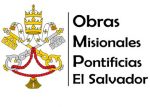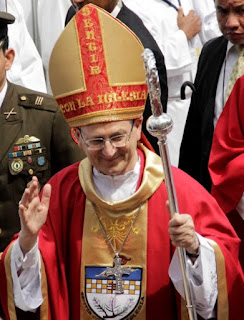HOMILY FOR THE BEATIFICATION OF MARTYR MONSIGNOR OSCAR ARNULFO ROMERO GALDAMEZCARDINAL ANGELO AMATO, PREFECT OF THE CONGREGATION FOR THE CAUSES OF SAINTS
SAN SALVADOR, MAY 23, 2015
READINGS
Book of Wisdom 3, 1-9
Psalm 125, 1-2ab. 2cd-3. 4-5. 6 (R.: 5)
Romans 8, 31b-39
St. John 17, 11b-19
Book of Wisdom 3, 1-9
Psalm 125, 1-2ab. 2cd-3. 4-5. 6 (R.: 5)
Romans 8, 31b-39
St. John 17, 11b-19
Dear brothers and sisters,
The beatification of Archbishop Romero, Bishop and martyr, is a celebration of joy and brotherhood. It is a gift of the Holy Spirit for the Church and for the noble nation of El Salvador. Speaking of his office of Bishop, St. Augustine said “the Gospel terrifies me. No one has wished for a safe and peaceful existence more than I have. Nothing is sweeter to me than to enjoy the divine treasure. Having instead to preach, to admonish, to correct, to edify, to turn myself over, is a great weight, a serious responsibility. It is a difficult task”. Indeed, for Augustine, as bishop, his reason for living turns into a passion for his faithful and his priests. And he asks the Lord to give him the strength to love heroically either through martyrdom or through affection. These words and these feelings could well have been spoken with the same intensity and sincerity by Archbishop Romero, who loved his faithful and his priests with affection and martyrdom, giving life as an offering of reconciliation and peace. As much is stated in the apostolic letter of beatification by Pope Francis when he says “Oscar Arnulfo Romero y Galdámez, Bishop and martyr, pastor according to the heart of Christ, evangelizer and father of the poor, heroic witness of the Kingdom of God, Kingdom of Justice, of fraternity, of peace”. [Applause.]
Today’s Bible readings give the meaning of Romero’s martyrdom. The word of God reminds us in fact that after the tragic death, the souls of the righteous are in the hands of God, and no torment can touch them. They are now, in peace and on the Day of Judgment they will shine as lights in the plain, they will govern nations and will have power over the peoples. The martyred Romero is therefore a light onto the nations and salt of the earth. If his persecutors have vanished in the shadow of oblivion and death, the memory of Romero on the other hand continues to live and gives comfort to the poor and the marginalized of the earth. [Applause.]
The Lord has done great things with the righteous who rightly can say with the Apostle Paul “who will separate us from the love of Christ? Perhaps tribulation, distress, persecution, famine, nakedness, danger, the sword? – no, nothing”. (Rom 8.) Neither death, nor life, nor angels, nor principalities, nor present, nor future, nor any other creature separated Romero from Christ and his Gospel of love, of justice, of fraternity, of mercy, of forgiveness. The words Jesus spoke before his passion when he entrusted his disciples to the father are very poignant. “Holy Father, keep them in your name. When I was with them, I kept them in your name and I kept them and none of them has been lost. I have given them your Word, and the world has hated them because they are not of the world as I am not of the world. I do not ask that you take them out of the world but that you keep them from the evil one”. (John 17.) This is the daily prayer that Romero made during the final tormented years of his life, until that fateful March 24, 1980 when a treacherous bullet fatally wounded him during the Eucharistic Celebration. His blood commingled with the redemptive blood of Christ. [Applause.]
Who was Romero? How did he prepare for martyrdom? Let's say first and foremost that Romero was a good priest, a wise Bishop, but mostly he was a virtuous man. He loved Jesus, he adored him in the Eucharist, he venerated the Virgin Mary, he loved the Church, he loved the Pope, he loved his people. Martyrdom was not an improvisation, but came after a long preparation. Romero, in fact, was like Abraham, a man of deep faith and unwavering hope. As a young seminarian in Rome, shortly before his ordination he wrote in his notes "this year will make my great surrender to God. My God, help me! Prepare me. You are everything; I am nothing. And yet, your love wants me to be much. Courage! With your all and my nothing we'll achieve much". A change… [Applause.]
A change in his life from gentle and almost shy pastor came with the murder of father Rutilio Grande, a priest… [Applause]. A Salvadoran Jesuit priest. He left teaching at the University to be the pastor of oppressed and marginalized farmers. This was the event that touched the heart of Archbishop Romero, who cried for his priest as a mother could do for her own son. He went quickly to Aguilares to offer the mass of suffrage, spending the night crying, watching and praying for the three innocent victims. For father Rutilio, and the two peasants who accompanied him. The peasants were now orphaned of their good father and Romero wished to take his post. [Applause.] In his homily, the Archbishop said "the liberation that Fr. Grande preached was inspired by faith. A faith that speaks to us of eternal life. The liberation that ends in the happiness of God. The liberation that comes from repentance from sin. The liberation that is founded on Christ, the only force of salvation". Here ends Romero. Since that day his language became more explicit in defending the oppressed people and persecuted priests, without worrying [about] the threats he received on a daily basis. Monsignor Romero spoke of a gift of the Holy Spirit which granted him a special pastoral fortitude, almost in contrast to his prudent and restrained temperament. He says "I considered ot a duty to place myself strongly in defense of my church and beside my people, so oppressed and despised". [Applause.]
Sister Luz Isabel, a religious Carmelite, present at the mass during which Romero was killed, testifies that that … the Archbishop told her "God leads me and he inspires me about what I say". And his words were not a provocation to hatred and revenge but a brave exhortation of a father to his divided children, who were invited to love, forgiveness, and concord. Gazing upon the beauty of nature and the splendor of the Salvadoran landscape, Romero used to say that the heaven started here on Earth. He looked at his beloved and tormented fatherland with hope in his heart. He dreamed that one day on the ruins of evil would have shone the glory of God and his love. His option for the poor was not ideological but Evangelical. [Applause.]
His charity… His charity extended also to his persecutors, to whom he preached conversion to the good and whom he assured forgiveness, notwithstanding everything. He was accustomed to be merciful. His generosity in giving to whoever asked was, according to witnesses, magnanimous, total, abundant. If someone asked, he gave.He once said that if he could get back all the money he had distributed, he would have become a millionaire. Pastoral charity infused him with extraordinary strength. One day a he told a priest he was continually threatened with death and that the national newspapers published daily criticisms against him. But, with a smile, he continued, "this does not discourage me. On the contrary, I feel more brave because these are the risks of the pastor. I have to go forward. I do not bear a grudge to anyone". [Applause.]
Dear brothers and sisters, Romero – Blessed Romero – is another shining star that burns in the American spiritual firmament. He belongs to the holiness of the American Church. [Applause.] Thankfully, there are many saints of this wonderful continent. Pope Francis recently recalled some. In addition to Friar Junípero Serra, who will be canonized on September 23 in Washington, D.C., the Holy Father enumerated so many other Saints who have distinguished themselves with various charisms. Contemplatives such as Rosa of Lima. Pastors that emanated the perfume of Christ and the smell of sheep as Toribio de Mogrovejo, François de Laval, Rafael Guizar Valencia. Humble workers in the vineyard of the Lord such as Juan Diego and Kateri Tekakwitha. Servants of the needy such as Pedro Clavel, Martín de Porres, Damian Molokai, Alberto Hurtado. Founders of communities devoted to the service of God and the poor such as Francisca Cabrini, Elizabeth Ann Seton, Katerina Drexel.Tireless missionaries such as Fray Francisco Solano, José de Ancheta, Alonso de Barzana, María Antonia de Paz Figueroa, Jose Gabriel de Rosario Brochero.And finally martyrs such as Roque González, Miguel Pro and Óscar Arnulfo Romero. [Applause.] And the Holy Father, Pope Francis, said “there has been holiness in America, so much sown holiness”.
The blessed Oscar Romero belongs to this mighty wind of holiness that blow on the American continent, the land of love and faithfulness to the good news of the Gospel. The beatification today of Mgr. Romero is then a feast of joy, of peace, of brotherhood, of welcome, of forgiveness. Everyone has a need of these gifts of the holy spirit which make our earthly existence a real foretaste of the joy of paradise of. “Coraggio”, Archbishop Romero would say in Italian: “courage!” His martyrdom is a boon to El Salvador, to families, to young people, to children, to the poor. But also to the rich. In short, for everyone. For all who seek serenity, joy, and happiness. Romero is not a symbol of division, but of peace, of harmony, of fraternity. [Applause.] Let us bear his message in our hearts, in our homes, and give thanks to the Lord for this his faithful servant who gives the Church his holiness and to all humanity his kindness, his gentleness.
In 1983, Saint John Paul II stood before Romero’s tomb and exclaimed “Romero is ours”. It is true. Romero belongs to the Church, but… [Applause.] But he also enriches humanity. Which he dreamt of with a good heart, with thoughts of respect and harmony, with actions of welcome and mutual assistance. Romero is ours, but he also belongs to all because for everyone he is the Prophet of the love of God and love of neighbor and the custodian of the right consciousness of every person.
Blessed Oscar Romero, pray for us! [Applause.]


